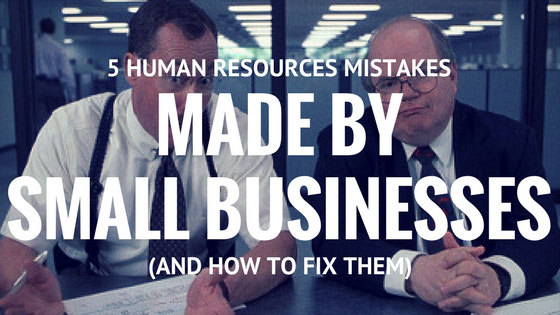Resources > Blog > 5 Human Resources Mistakes Made by Small Businesses (and How to Fix Them)
There are a number of reasons small businesses struggle with human resources.
Most start out short on both time and money. They're so determined to succeed that they forget to protect their most valuable assets: the people who make their businesses run.
Simply put: If your employees feel they're being taken care of, so will your customers. That's a data-backed fact. Happy employees are 12% more productive than their counterparts, and companies with happy employees outperform their competition by 20%.
Now, you're legally obligated to have specific human resource policies to keep your employees protected and satisfied. But legal protection isn't what we're talking about here. You need to look at HR an investment. Having a comfortable, efficient, and effectively operated workplace means more productivity and better results. The importance of establishing a positive team culture cannot be overstated. For that reason, a comprehensive human resource plan is one of the first steps in establishing lasting success.
Today, we're going to look at some of the HR roadblocks that tend to get in the way of small business's success. They are:
- Hasty hiring practices
- An outdated (or non-existent) employee handbook
- Slow and inconsistent onboarding
- Lack of recorded employee feedback
- Undefined roles
Let's dive in, and take a more in depth look at each of these common human resource mistakes (and, more importantly, how to fix them).
#1 Small Business HR Mistake: Hasty Hiring Practices
When it comes to hiring, there's been much debate. Is it best to hire in swiftly or spend months searching for the perfect candidate? Regardless of which side you agree with, it's a worthy debate. After all, 27 percent of HR professionals reported a single bad hire costs more than $50,000. That's more than most businesses can afford to lose on a single bad decision.
As a rule of thumb, the hiring process for a specific role should take two to three weeks and it is recommended to interview several qualified candidates. Interviewing is a listening exercise so ask similar questions and allow each interviewee time to respond thoughtfully. This will help you avoid becoming starstruck by a great candidate you really hit it off with (or blinded by a great candidate who wasn't particularly warm but offered perfect responses).
Remember: the key to hiring is to be objective. Ask questions that relate to the skills a candidate would need to excel in the role you're hiring for and take notes for a more complete debriefing.
#2 Small Business HR Mistake: An Outdated (or Non-Existent) Employee Handbook
The Employee Handbook. Has there ever been a piece of business writing so "important" that goes unread? The truth is, employees tend to snicker at their handbooks, and here's the reason: most employers don't take them seriously. So, if the handbook isn't valued by the employer, why should the people they hire value it?
Aside from containing some measure of the essentials-scheduling practices, non-disclosure agreements, safety and security policies, anti-discrimination policies, standards of conduct, vacation and leave policies, so forth-your employee handbook shouldn't be hidden beneath the cash register, collecting cobwebs and dust. Make sure each employee has a copy, and make sure you stress its importance.
If your employee handbook is out of date (or doesn't exist yet), here's a great resource from payment processing company Square to help you get started!
#3 Small Business HR Mistake: Slow and Inconsistent Onboarding
If you've worked a few different jobs, you've probably been frustrated at one time or another with a slow or confusing onboarding process.
A little preparation on behalf of management can go a heck of a long way in solidifying your business's onboarding process. It's key to plan out the first week of a new employee's tenure with training and other activities. This will help familiarize new employees with your space, people, practices, and culture. From there, carefully balance positional responsibilities with trainings over the next 30 days. Check in along the way to see if the pace should be switched up for your next hire.
#4 Small Business HR Mistake: Lack of Recorded Employee Feedback
Everyone knows that talking to your employees about their job performance is important, but casual conversation isn't always enough. Scheduled, formal, and written feedback is key to employee growth. Performance-related conversations that take place between you and your employees should be documented. If the positions within your organization have defined growth paths (for promotion), you should use this feedback to address an employee's individual progress. Your team members will be motivated by actually seeing their progress on paper, and who doesn't want motivated people working for them?!
#5 Small Business HR Mistake: Undefined Roles
There is nothing more frustrating for a new employee than having their role outlined in a job posting, verbally described in their interview, accepting the job based on this understanding, and then being assigned responsibilities they didn't sign up for. While in a small company it's often necessary for employees to wear different hats, you should make an effort to align expectations with reality.
As your business grows, you will inevitably try to get the most out of your employees. Avoid spreading your employees too thin across multiple roles. Define roles clearly on day one and communicate often if things are going to change.
***
Human resources for small businesses can seem complex and daunting, but it's necessary.
You're trying to get your business off the ground, and it's easy to forget that your employees are some of your most important assets. If you're an owner or a manager, you're adept at seeing the big picture. Don't get so caught up in the big picture that you forget about the foundation of your business-your employees.
When it comes to your employees, happiness breeds success.

















